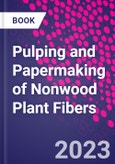Pulping and Papermaking of Non-wood Plant Fibres presents the latest technologies associated with the papermaking process. With chapters specific to each non-wood species, the book provides step-by-step guidance on processes such as pulping, bleaching, blending and beating. Non-wood fibers are practical for pulp and paper production due to their chemical content of cellulose, hemicellulose and lignin percentages. Beginning with a general overview of non-wood fibers in the papermaking process, chapters then take a deep dive into different raw materials and their processes, including bamboo, corn stalk, pineapple leaves and sugarcane. This book is an essential resource for researchers, scientists and industry specialists.
Please Note: This is an On Demand product, delivery may take up to 11 working days after payment has been received.
Table of Contents
1. Review of Non-wood Plant Fibres for Pulp and Paper2. Principal of Pulping Process for Non-wood Plant
3. Bleaching Process for Non-wood Fibres
4. Pulping and Papermaking of Nigerian Bamboo
5. Pulping and Papermaking of Malaysian Bamboo
6. Pulping and Papermaking of Miraculous Berry Stalk
7. Pulping and Papermaking of Corn Stalk
8. Pulping and Papermaking of Esparto
9. Pulping and Papermaking of Jute
10. Pulping and Papermaking of Kenaf
11. Pulping and Papermaking of Oil Palm Empty Fruit Bunch
12. Pulping and Papermaking of Roselle (Hibiscus sabdariffa L.)
13. Pulping and Papermaking of Sarkanda
14. Pulping and Papermaking of Reeds Bagasse
15. Pulping and Papermaking of Sorghum Bagasse
16. Pulping and Papermaking of Pineapple Leaves
17. Pulping and Papermaking of Sugar Cane Bagasse
18. Pulping and Papermaking of Hemp
19. Pulping and Papermaking of Flax
20. Pulping and Papermaking of Cotton
21. Pulping and Papermaking of Aquatic Macrophyte Fibres
22. Blending and Beating Process in Non-wood Papermaking Production
Authors
Z.M.A. Ainun Program of Pulp and Paper and Pollution Control, Laboratory of Biopolymer and Derivatives, Institute of Tropical Forest and Forest Products (INTROP), Universiti Putra Malaysia, Selangor, Malaysia. Z.M.A. Ainun works on the Program of Pulp and Paper and Pollution Control at the Laboratory of Biopolymer and Derivatives in the Institute of Tropical Forest and Forest Products (INTROP), Universiti Putra Malaysia, Selangor, Malaysia. S. M. Sapuan Professor of Composite Materials, Advanced Engineering Materials and Composites Research Centre (AEMC), Department of Mechanical and Manufacturing Engineering, Universiti Putra Malaysia, Malaysia.S.M. Sapuan is a Professor (Grade "A�) of composite materials in the Department of Mechanical and Manufacturing Engineering, at the Universiti Putra Malaysia. He is also Head of the Advanced Engineering Materials and Composites Research Centre (AEMC) at UPM. He attained his BEng in mechanical engineering from the University of Newcastle, in Australia and then went on to receive his MSc in engineering design and PhD in materials engineering, from De Montfort University in the UK. He is a Professional Engineer and a Fellow of many professional societies, including the Society of Automotive Engineers; the Academy of Science Malaysia; the International Society for Development and Sustainability; the World Academy of Sciences; the Plastic and Rubber Institute Malaysia (PRIM); the Malaysian Scientific Association and the Institute of Materials Malaysia. He is an Honorary Member and past Vice President of the Asian Polymer Association and Founding Chairman and Honorary Member of The Society of Sugar Palm Development and Industry, Malaysia. During the course of his career, he has produced over 2500 publications, including 989 journal papers, 68 books and 246 book chapters.
R.A. Ilyas Senior Lecturer, School of Chemical and Energy Engineering, Faculty of Engineering; Center for Advanced Composite Materials (CACM), Universiti Teknologi Malaysia, Johor Bahru, Johor, Malaysia.R.A. Ilyas is a senior lecturer in the Faculty of Chemical and Energy Engineering, Universiti Teknologi Malaysia, Malaysia. He is also a Fellow of International Association of Advanced Materials (IAAM), Sweden, Fellow of International Society for Development and Sustainability (ISDS), Japan, a member of Royal Society of Chemistry, UK and Institute of Chemical Engineers (IChemE), UK, Chair of Science Outreach for Young Scientists Network - Academy of Sciences Malaysia (YSN-ASM) 2023. He received his Diploma in Forestry, Bachelor's Degree (BSc) in Chemical Engineering, and Ph.D. degree in the field of Biocomposite Technology & Design at Universiti Putra Malaysia, Malaysia. R.A. Ilyas was the recipient of the MVP Doctor of Philosophy Gold Medal Award UPM 2019, for Best Ph.D. Thesis and Top Student Award, INTROP, UPM. He was awarded with Outstanding Reviewer by Carbohydrate Polymers, Elsevier United Kingdom, Top Cited Article 2020-2021 Journal Polymer Composite, Wiley, 2022, and Best Paper Award at various International Conferences. R.A. Ilyas also was listed and awarded among World's Top 2% Scientist (Career-Long Achievement) Year 2022 and 2023, World's Top 2% Scientist (Subject-Wise) Citation Impact during the Single Calendar Year 2019-2023 by Stanford University, US, PERINTIS Publication Award 2021 and 2022 by Persatuan Saintis Muslim Malaysia, Emerging Scholar Award by Automotive and Autonomous Systems 2021, Belgium, Young Scientists Network - Academy of Sciences Malaysia (YSN-ASM) 2021, UTM Young Research Award 2021, UTM Publication Award 2021&2023, and UTM Highly Cited Researcher Award 2021. In 2021, he won Gold Award and Special Award (Kreso Glavac (The Republic of Croatia) at the Malaysia Technology Expo (MTE2022), Gold Award dan Special Award at International Borneo Innovation, Exhibition & Competition 2022 (IBIEC2022), and, a Gold Award at New Academia Learning Innovation (NALI2022). He was awarded with Best Scientific Book Award from COMSTECH, Organization of Islamic Cooperation (OIC), Pakistan and ModTech, Romania. His main research interests are (1) Polymer Engineering (Biodegradable Polymers, Biopolymers, Polymer composites, Polymer-gels) and (2) Material Engineering (Natural fiber reinforced polymer composites, Biocomposites, Cellulose materials, Nano-composites). To date he has authored or co-authored more than 500 publications on green materials related subjects.








